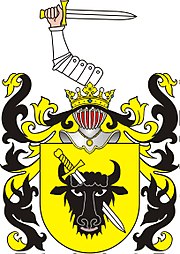Feliks Lubienski
|
Count Feliks Walezjusz Władysław Łubieński |
|
|---|---|
 
Pomian arms (Łubieński family crest)
|
|
| Spouse(s) | Teodora Rogalińska Tekla Teresa Lubienska, née Bielinska |
| Issue | |
| Noble family | Łubieński |
| Father | Celestyn Łubieński |
| Mother | Paula Szembek |
| Born |
22 November 1758 Minoga, Poland |
| Died | 2 October 1848 (aged 89) Guzów, Partitioned Poland |
Feliks Walezjusz Władysław Łubieński (born 22 November 1758 Minoga near Olkusz, died 2 October 1848 Guzów) was a Polish politician, jurist, Minister of Justice in the Grand Duchy of Warsaw, starosta of Nakieł, a member of the Friends of the Constitution and a Prussian count. With the Code Napoleon, he introduced civil marriage and divorce in traditionally Catholic Poland.
The Łubieński clan belongs to the Polish nobility, 'szlachta', and originates from Łubna-Jarosłaj near Sieradz. Feliks was the son of Celestyn and Paula, née Szembek, of Austrian descent. His father died in 1759 and his mother re-married Jan Prosper , starosta of Guzów, with whom she had a son, . Her second husband died in 1761. She next married Andrzej Ogiński, starosta of Troki, with whom she had a daughter, Józefa. and a third son, Michał Kleofas Ogiński. He became a noted composer and was Polish envoy to London, among other capitals, during the crisis period for his nation that were the Partitions of Poland. Owing to this family connection, Feliks was able, later in life, to take over the vast estate of Guzów.
Up to the age of five years, Felix lived with his maternal grandmother, Jadwiga Szembekowa in Minoga. Then his upbringing was taken over by his paternal granduncle, the primate, Władysław Aleksander Łubieński (1703-1767), to whom Feliks owed his 'magnificent' start in life. From 1767 he was educated by the Jesuits in Warsaw. He then studied law at the universities of Siena and Rome. This was followed by a short period of work in the office of the Grand Chancellor of Wilno, Michał Fryderyk Czartoryski. However the latter soon died, and having married Teodora Rogalińska in 1776, Feliks settled with her on his estates near Sieradz at Kalinowa and at Szczytniki. The couple were childless and the marriage was annulled in 1778.
...
Wikipedia
